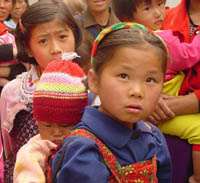Food aid to North Korea delayed in China

Shipments of thousands of tons of food widely wanted in impoverished North Korea were delayed because of a railway dispute between the regime and Chinese train companies.
Some 8,000 tons of corn and wheat flour are sitting mostly in warehouses in the northeast Chinese town of Dandong, which borders North Korea, said Paul Risley, a Bangkok-based spokesman for the U.N. World Food Program or WFP.
"There is critically needed humanitarian food aid that is purchased and waiting for shipment," Risley said by telephone. "We need for that food to be released."
The snarl means hundreds of thousands of North Koreans are going hungry in areas devastated by summer floods, and it could indicate strained relations between the neighbors.
Beijing has long been Pyongyang's biggest aid source and top trading partner, but its patience has been wearing thin since the North ignored Chinese interests by conducting its first nuclear test a year ago - underscoring that six-nation disarmament talks hosted by China had not dimmed the regime's nuclear ambitions.
Risley said the delay, which has lasted for several weeks, was triggered by a dispute between Chinese companies who send freight trains to the North but do not get them back, or have them come back later than promised.
China's railway ministry informed the WFP about the dispute at an Oct. 11 meeting, and said no more trains would be sent across the border until the wagons were returned, Risley said.
The ministry did not give more details on the dispute or say how many trains were involved, he said.
Citing unidentified analysts, the Financial Times newspaper said 1,800 train cars have not been returned because North Koreans were dismantling them and selling them for scrap metal.
A railway ministry official who gave only his surname, Huang, said he was "not aware of the problem."
"Rail transportation between China and North Korea is normal and has no problem at all," Huang said.
North Korea has relied on foreign assistance to feed its 23 million people for more than a decade since natural disasters and mismanagement devastated the country's economy in the mid-1990s.
The country has been short of about 1 million tons of food annually in recent years, making up the shortfall with aid from South Korea, China and international aid organizations.
In past years, the WFP fed about 6.5 million people annually in the North, but scaled back its proposed program last year to 1.9 million people after Pyongyang requested in 2005 to switch its emphasis from food aid to development assistance, saying food supplies were adequate.
But earlier this year, the secretive Stalinist regime issued a rare request for the WFP to expand its assistance because it was facing one of its biggest food shortages in the past decade, the result of a poor harvest and a huge drop in donor aid.
Risley said the bulk of the food aid that is being delayed will go to more than 215,000 flood victims suffering after a week of severe rainstorms - the worst in 40 years - in August destroyed more than 11 percent of North Korea's crops. More than 220 people were killed and 89,000 people were left homeless.
"WFP food stocks have been stretched and are nearly depleted because of the extra demands for providing food for the victims of the August floods," Risley said.
Subscribe to Pravda.Ru Telegram channel, Facebook, RSS!


